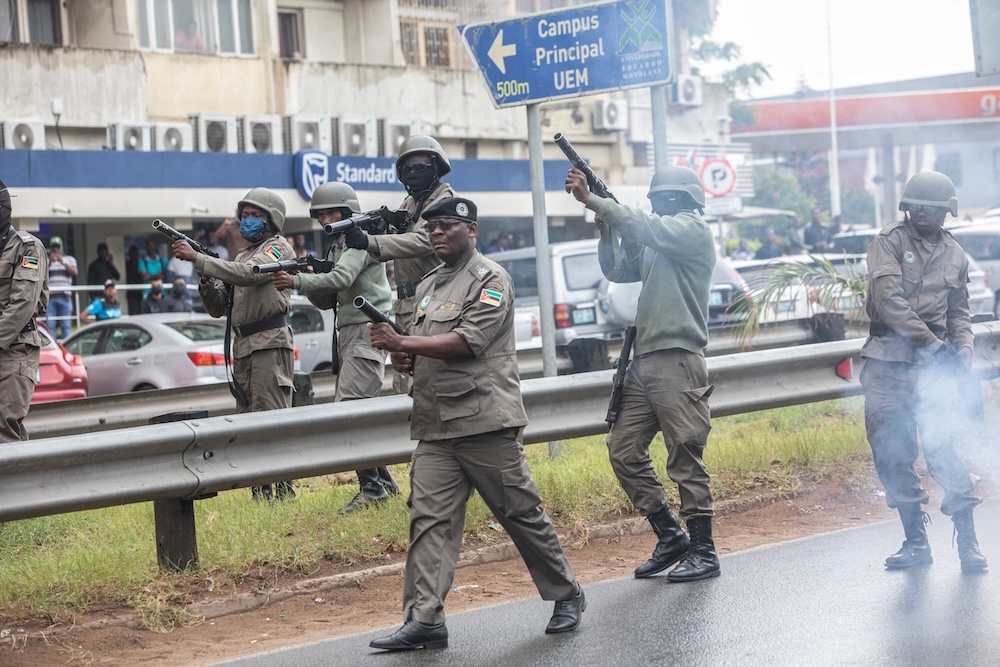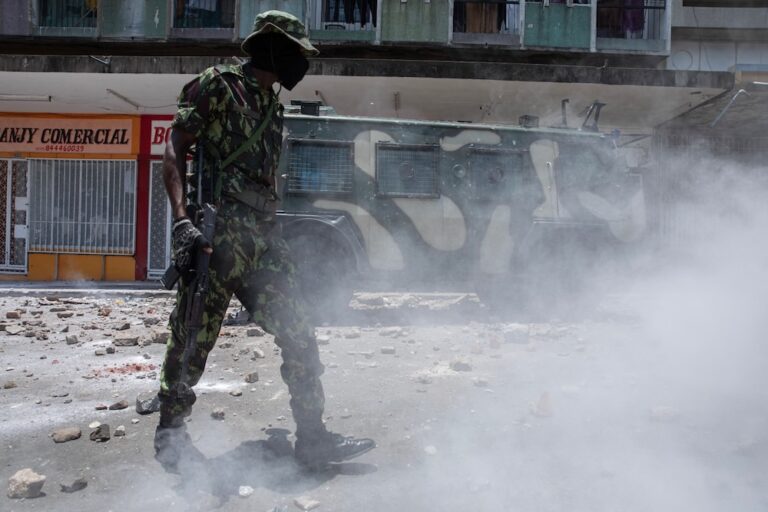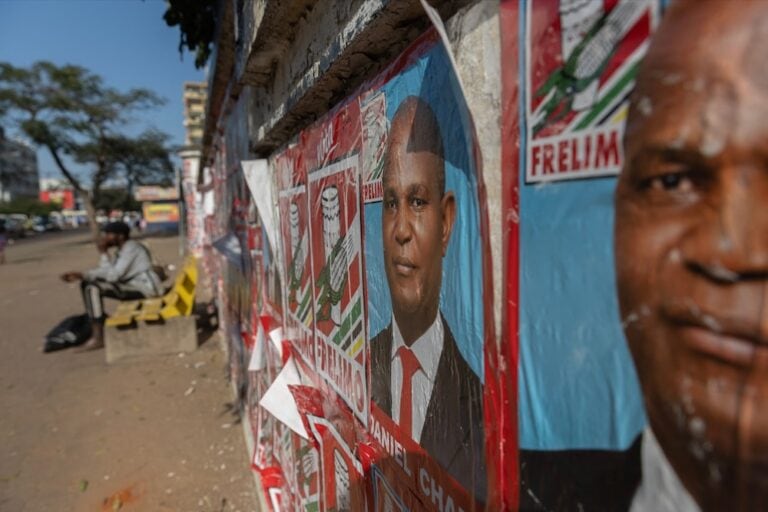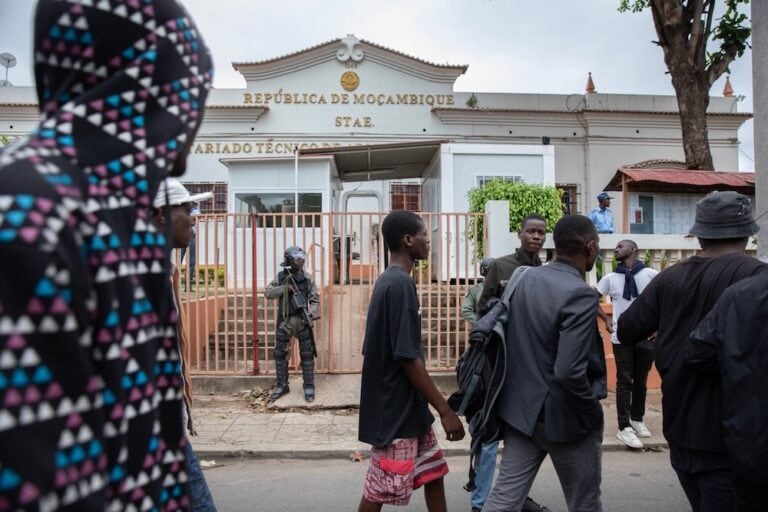Mozambican authorities are facing criticism for failing to thoroughly investigate the killing of opposition figures following the disputed October 2024 elections.
This statement was originally published on hrw.org on 13 April 2025.
Conduct effective investigations, fair prosecutions
Mozambican authorities have failed to conduct credible investigations into the wave of political killings following the October 2024 general elections, Human Rights Watch said today. Unidentified gunmen, some wearing security force uniforms, shot dead at least 10 key opposition party officials from October through March 2025.
Most of the people targeted had been involved in organizing national street protests contesting the election results. They either belonged to the main opposition party, Optimistic People for the Development of Mozambique (Partido Optimista pelo Desenvolvimento de Moçambique, or Podemos) or were supporters of the independent presidential candidate, Venâncio Mondlane. The police have announced investigations into some of the cases but have not identified or arrested any suspects or provided public updates on the status of investigations.
“The failure of Mozambique’s police to credibly investigate the killings of key opposition members sends a chilling message that the authorities have no interest in bringing those responsible to justice,” said Ashwanee Budoo-Scholtz, deputy Africa director at Human Rights Watch. “Prompt, thorough, and effective investigations and fair prosecutions are needed if these apparently politically motivated killings are to stop.”
Human Rights Watch documented the killings of 10 opposition figures across the country through remote interviews with 21 people, including witnesses, relatives of the victims, journalists, and the police.
In one case, gunmen in a car ambushed Elvino Dias, the lawyer for Mondlane and the Podemos party, and Paulo Guambe, a Podemos election official, in Maputo and shot them dead. The other cases, most of them Podemos party officials and supporters, were similar.
On October 24, Mozambique’s election commission declared Daniel Chapo and his ruling party Front for the Liberation of Mozambique (Frente de Libertação de Moçambique, or Frelimo) the winners of the country’s October 9 general elections. The elections were marred by political killings, widespread irregularities, and tight restrictions on freedom of expression and assembly.
The opposition Podemos party contested the election results in nationwide demonstrations. Security forces cracked down on the protests, killing over 300 people and injuring hundreds more. Podemos submitted a report to the Office of the Attorney General alleging that more than 100 party members were killed and alleged that the police planned and carried out the killings.
Victims’ relatives and lawyers told Human Rights Watch that they regularly reached out to police for details of the investigations but did not receive any indication that there was any investigation under way or that authorities had identified a suspect in any of the cases. No updates were provided to family members or the public.
International human rights treaties to which Mozambique is party, including the African Charter on Human and Peoples’ Rights and the International Covenant on Civil and Political Rights, obligate the government to investigate and prosecute alleged violations of human rights and provide appropriate remedies to victims.
The Southern African Development Community, the African Union, concerned governments, and major developmental partners of Mozambique should call on the government to ensure that there is a thorough investigation into the post-election violence, including apparent politically motivated killings, and fairly prosecute all those responsible, Human Rights Watch said.
“Impunity for attacks against political rivals encourages further political violence and undermines democratic governance,” Budoo-Scholtz said. “The Mozambican authorities should order a serious and impartial investigation into abuses before, during, and since the October elections and hold all those responsible to account.”
For further details on politically motivated killings documented by Human Rights Watch, please see below.
The protests following the October 2024 elections in Mozambique drew thousands of people contesting their results as well as the rising cost of living and other social problems. They forced the temporary closure of banks, schools, and shops in Maputo and other cities. The media reported extensive looting and vandalism and cases of protesters killing police officers and destroying state and private structures and offices of the ruling party, Frelimo, across the country.
Security forces were implicated in serious human rights abuses, including the unlawful killing of over 300 protesters and bystanders, among them children. Security forces have also injured hundreds of people and arbitrarily detained thousands of others.
Opposition parties have alleged that agents of the National Criminal Investigation Service (Serviço Nacional de Investigação Criminal, SERNIC) have gone from house to house assaulting people accused of organizing demonstrations. Podemos alleged that 106 of its members and supporters have been murdered since the protests began.
The local monitoring group Plataforma Decide documented at least 18 killings of prominent opposition members across the country as of March 25.
Apparent Politically Motivated Killings Since October 2024
Elvino Dias and Paulo Guambe, in Maputo
On October 18, 2024, after 9 p.m., unidentified gunmen shot dead Elvino Dias, the lawyer for the Podemos party and independent presidential candidate, Venâncio Mondlane, and Paulo Guambe, a Podemos election official, in Maputo. A 27-year-old witness told Human Rights Watch that gunmen in civilian clothes, driving a white Mazda BT-50, ambushed the victims’ car as it made a turn onto Joaquim Chissano Avenue, firing several shots from what appeared to be Kalashnikov-style assault rifles. The Center for Democracy and Human Rights and the media reported that 25 bullet rounds were fired at the vehicle.
The police said the two men died at the scene. The attack drew worldwide condemnation, including from United Nations Secretary-General António Guterres. Following the attack, SERNIC reportedly confiscated the CCTV cameras from banks and an embassy near the scene, allegedly to assist with investigations. During a news conference on November 22, a SERNIC spokesperson said an investigation was underway, but no one has been arrested or charged with the killings, and there has been no public update on the status of the investigation.
Eugénio Raúl Madeira, in Zambezia Province
On December 22, in the early hours of the morning, unidentified gunmen fatally shot Eugénio Raúl Madeira, the Podemos mobilization secretary for Mocuba district, in Zambezia province, near his house. A friend of Madeira who witnessed the attack told Human Rights Watch that a white Toyota vehicle with tinted windows and without a license plate approached the square, as Madeira and others prepared to start their workday as moto-taxi drivers. The friend said that someone fired two bullets from inside the car, striking Madeira in the head:
“We were positioning our motorbikes to start the day when this Toyota approached slowly. I initially thought it was a client, but I then realized the car didn’t have a license plate. While I was still trying to figure out what was happening, the window of the front passenger seat opened, a pistol emerged and fired two bullets straight at Eugénio’s head. He died there.”
Madeira and another Podemos official, Xadreque Francisco, had been the party’s focal points in Mocuba district and leaders of the protests there. During a violent protest in November, Zambezia provincial police had accused the two men of acts of vandalism.
Four days after Madeira’s killing, three gunmen in civilian clothes broke into Francisco’s house early on December 22 and fired several shots, wounding him, the media reported.
Abudo Bacar Lawia, in Cabo Delgado Province
On the evening of January 3, 2025, Abudo Bacar Lawia, the chef mobilizer of the protests in the Montepuez district of Cabo Delgado province, was gunned down outside a friend’s house. The friend said that at about 8 p.m., as they stood by the gate of the compound, two men approached wearing the uniforms of the communal militia, a government-organized local counterterrorism force.
“We didn’t suspect them because we thought they were doing their normal night patrolling of the town,” the friend said. “Then suddenly I heard gunshots, and I lost consciousness. … I woke up at the hospital where I was treated for a gunshot injury [in the shoulder].”
Two witnesses, a friend of Lawia and a police officer, said that Lawia died after being hit in the chest by two bullets fired from a pistol.
Before his death, Lawia had received death threats in messages and phone calls, a relative told Human Rights Watch. “He was an open supporter of VM [Venâncio Mondlane] and didn’t shy away from leading and organizing protests,” he said. “Police officers warned him several times that he would be targeted one day, but he didn’t care.”
On January 6, a police spokesman for Cabo Delgado confirmed that the investigative police had collected evidence from the crime scene and that a criminal file had been opened. Human Rights Watch contacted the Cabo Delgado police spokesperson on February 7 via text message seeking an update on the status of the investigation. The spokesperson referred Human Rights Watch to her superiors, but the Cabo Delgado police did not respond to Human Rights Watch calls.
Rachide Eduardo, in Cabo Delgado Province
Rachide Eduardo was shot and killed on January 6, at about 6 p.m., at his home in Ntutupue town, in the Ancuabe district of Cabo Delgado province. Eduardo was a Podemos party leader in Ntutupue and had helped organize and lead various anti-government demonstrations across the district. He was a close friend of Arlindo Chissale, a journalist actively supporting the opposition candidate, who was allegedly forcibly disappeared on January 7 by a group of men, three of whom wore military uniforms.
A neighbor of Eduardo said that on the night of his death, he heard several gunshots coming from inside his house. He saw two men quickly leave the premises and enter a Mahindra pickup vehicle, like those used by Mozambican security forces. He said:
“I saw the car parked for about an hour outside Rachide’s house. It wasn’t the first time. Every now and then, that car would park in different places along our road. Sometimes the occupants wore uniforms … that dark green uniform like UIR [Unit of Rapid Intervention]. On the day they killed Rachide, the two assassins were wearing plain clothes.”
Sande Antonio, in Sofala Province
Sande Antonio, 30, a Podemos party delegate in Sofala province, was shot dead at his home in Buzi town, in the early hours of January 16. A Podemos official, Vale Magalhaes, told the media that at about 1 a.m. that day, Antonio sent a text message saying that police officers had surrounded his home. When Magalhaes tried to phone Antonio, no one answered. He said he later received the news that unidentified gunmen had shot Antonio three times, “one [bullet] in his head, one in the chest, and another in the back.”
A journalist who had interviewed Antonio on several occasions said that the politician had fled his home for a safer location after he started receiving death threats for denouncing ballot stuffing during the elections.
The journalist said Antonio returned to his home on January 15 because he believed that it was safe to do so since Chapo had been sworn into office as president.
As of March 26, police had not made any public comments about Antonio’s killing. One of his relatives said that the police had informed the family that a criminal investigation had been opened and that they were trying to trace the gunmen, but no further information was provided.
Daniel Guambe and Rafito Sitoe, in Inhambane Province
On March 8, at about 10 p.m., two gunmen stepped out of their car carrying Kalashnikov-style assault rifles and fired at least seven bullets at an Isuzu vehicle transporting two prominent Podemos members, Daniel Guambe, 28, and Rafito Sitoe, 21, in Massinga village, Inhambane province, various sources reported. Members of the community tried to rescue the men, but they died on their way to the hospital, Podemos confirmed in a statement. Days before the fatal attack, Sitoe and Guambe had led the preparations for a surprise visit by Mondlane to Massinga on February 26, a party official told Human Rights Watch. The police have yet to publicly comment on the killings.
Ivo Armando Nhantumbo and João de Deus Nhachengo, in Inhambane Province
On March 15, local residents found the bodies of Ivo Armando Nhantumbo and João de Deus Nhachengo, two well-known Podemos members and Mondlane supporters, in Inhambane province, media reported. Plataforma Decide reported that the body of Nhachengo had three bullet wounds to the chest, while Nhantumbo had one bullet wound to the head and his genitals had been cut off.
The Mozambican police have yet to publicly comment on the killings of Nhachengo and Nhantumbo. On March 21, the spokesman for the General Command of the Mozambican Police, Orlando Mudumane, told Human Rights Watch that “authorities are concerned about the killings, and investigative units are on the terrain searching for the perpetrators of the crimes.”



